Santa Cruz de Tenerife, 7 Mar. (Europa Press) –
The activist, researcher, and lecturer from the University of La Laguna, María Eugenia Monzón, has warned this Friday that the achievements made by the feminist collective during their years of “struggle” are “reversible”, as they remain in the control of “power”. Therefore, there is a need for greater “organisation” and unification of “objectives”.
To mark International Women’s Day on 8th March, the Cabildo de Tenerife facilitated a discussion at the Insular Palace involving the insular director of equality and diversity, Patricia León; the activist, researcher, and university lecturer, María Eugenia Monzón Perdomo; and the head of the Technical Unit of Equality, Aña Peña Méndez, to contemplate the inequalities faced by women, the Canarian feminist movement, and the corresponding institutional policies.
The lecturer elaborated on her dual role in both research and academic work – she holds a doctorate in modern history – alongside her feminist activism, which she claims began with a sense of “militancy.” She recalled “the gaps” identified in her academic field during the 1980s concerning the representation of women in history, which encouraged her to work towards disseminating knowledge in this area.
She remarked that every 8th March, International Women’s Day, is a time for “commemoration, celebration, and connection”, when women feel “central” for the day, and it is crucial to acknowledge the “rights we possess today, which have been won and not gifted”, as the journey towards collective struggle “has been indispensable for everything.”
Within that context, she noted that these achievements can be “reversible” because “they lie in the hands of power”, primarily dominated by men. However, she highlighted that there are increasingly “more allies” supporting the fight for women’s equality in 21st-century society, advocating that this is a matter of “justice.”
The activist also pointed out to the Cabildo de Tenerife that the rhetoric presently emanating from “the extreme right”, across its various levels, both internationally and regionally, “directly targets women” with the “aim” of “returning us to our homes, to the traditional values we’ve moved beyond”. She continued, stating that “women have demonstrated that we can occupy any space and sphere.”
In light of this situation, she called for the feminist movement to focus on “organisation and collective struggle” to “unify objectives” and “defend what has been conquered”. “This backlash likely stems from the progress and achievements that have been made, alongside the fear perceived by certain sectors of society misinterpreting what equality truly means,” remarked the researcher regarding the rise of certain discourses.
She also advocated for the inclusion of “gender perspectives” in other social struggles being waged in the islands, such as the ongoing transformation of the tourism model in the Canary Islands, emphasising the need to “illustrate” equality throughout this process of change, as it “affects women in entirely different ways.”
Concerning the feminist movement’s relationship with institutions, she confessed that the collective has felt “at times, inadequately heard.” She characterised this relationship as “complex” due to instances where “the equality policies of the institutions display their shortcomings, influenced by the dynamics of political cycles.”
“Transforming society profoundly requires time; it necessitates changing mindsets and customs. The political cycle lasts four years, and all of this cannot be resolved in four years,” the ULL lecturer stressed, analysing the intricacies that this transformation process entails. This is not only due to potential political changes but also because, on other occasions, they tend to “repeat” the same strategies.
















